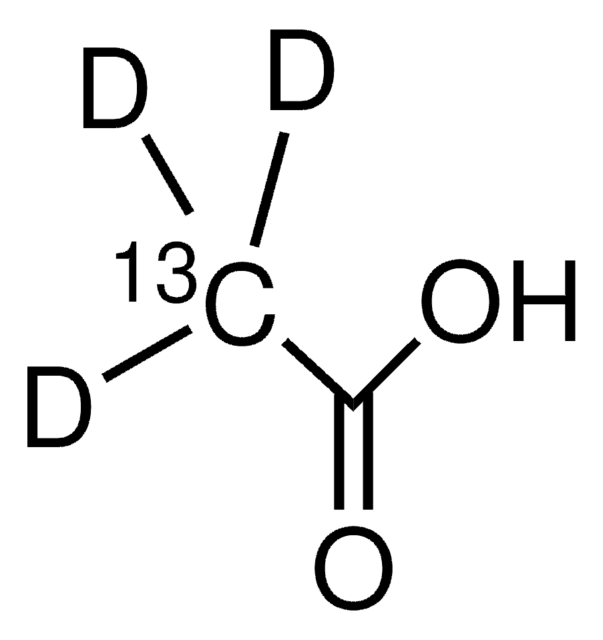151785
Acetic acid-d4
≥99.5 atom % D
Synonyme(s) :
Acetic-d3 acid-d, Tetradeuteroacetic acid
About This Item
Produits recommandés
Densité de vapeur
2.07 (vs air)
Pression de vapeur
11.4 mmHg ( 20 °C)
Pureté isotopique
≥99.5 atom % D
Pureté
≥99% (CP)
Forme
liquid
Température d'inflammation spontanée
800 °F
Limite d'explosivité
16 %
Technique(s)
NMR: suitable
bio NMR: suitable
Impuretés
≤0.0500% water
water
Indice de réfraction
n20/D 1.368 (lit.)
Point d'ébullition
115.5 °C (lit.)
Pf
15-16 °C (lit.)
Densité
1.119 g/mL at 25 °C (lit.)
Changement de masse
M+4
Chaîne SMILES
[2H]OC(=O)C([2H])([2H])[2H]
InChI
1S/C2H4O2/c1-2(3)4/h1H3,(H,3,4)/i1D3/hD
Clé InChI
QTBSBXVTEAMEQO-GUEYOVJQSA-N
Vous recherchez des produits similaires ? Visite Guide de comparaison des produits
Description générale
Application
Acetic acid-d4 may also be used as a deuterated solvent in the 1H NMR spectral studies of the following:
- CB2, a CNBr peptide
- α - tocopherol succinate hydrophobically modified chitosan(CS-TOS)
Produits recommandés
Mention d'avertissement
Danger
Mentions de danger
Conseils de prudence
Classification des risques
Eye Dam. 1 - Flam. Liq. 3 - Skin Corr. 1A
Code de la classe de stockage
3 - Flammable liquids
Classe de danger pour l'eau (WGK)
WGK 1
Point d'éclair (°F)
104.0 °F - closed cup
Point d'éclair (°C)
40 °C - closed cup
Équipement de protection individuelle
Faceshields, Gloves, Goggles, type ABEK (EN14387) respirator filter
Certificats d'analyse (COA)
Recherchez un Certificats d'analyse (COA) en saisissant le numéro de lot du produit. Les numéros de lot figurent sur l'étiquette du produit après les mots "Lot" ou "Batch".
Déjà en possession de ce produit ?
Retrouvez la documentation relative aux produits que vous avez récemment achetés dans la Bibliothèque de documents.
Les clients ont également consulté
Articles
Use this reference table to find the coupling values and chemical shifts of our NMR (deuterated) solvents. Melting and boiling points, molecular weight, density, and CAS number are also listed.
Use this reference table to find the coupling values and chemical shifts of our NMR (deuterated) solvents. Melting and boiling points, molecular weight, density, and CAS number are also listed.
Use this reference table to find the coupling values and chemical shifts of our NMR (deuterated) solvents. Melting and boiling points, molecular weight, density, and CAS number are also listed.
Use this reference table to find the coupling values and chemical shifts of our NMR (deuterated) solvents. Melting and boiling points, molecular weight, density, and CAS number are also listed.
Notre équipe de scientifiques dispose d'une expérience dans tous les secteurs de la recherche, notamment en sciences de la vie, science des matériaux, synthèse chimique, chromatographie, analyse et dans de nombreux autres domaines..
Contacter notre Service technique













